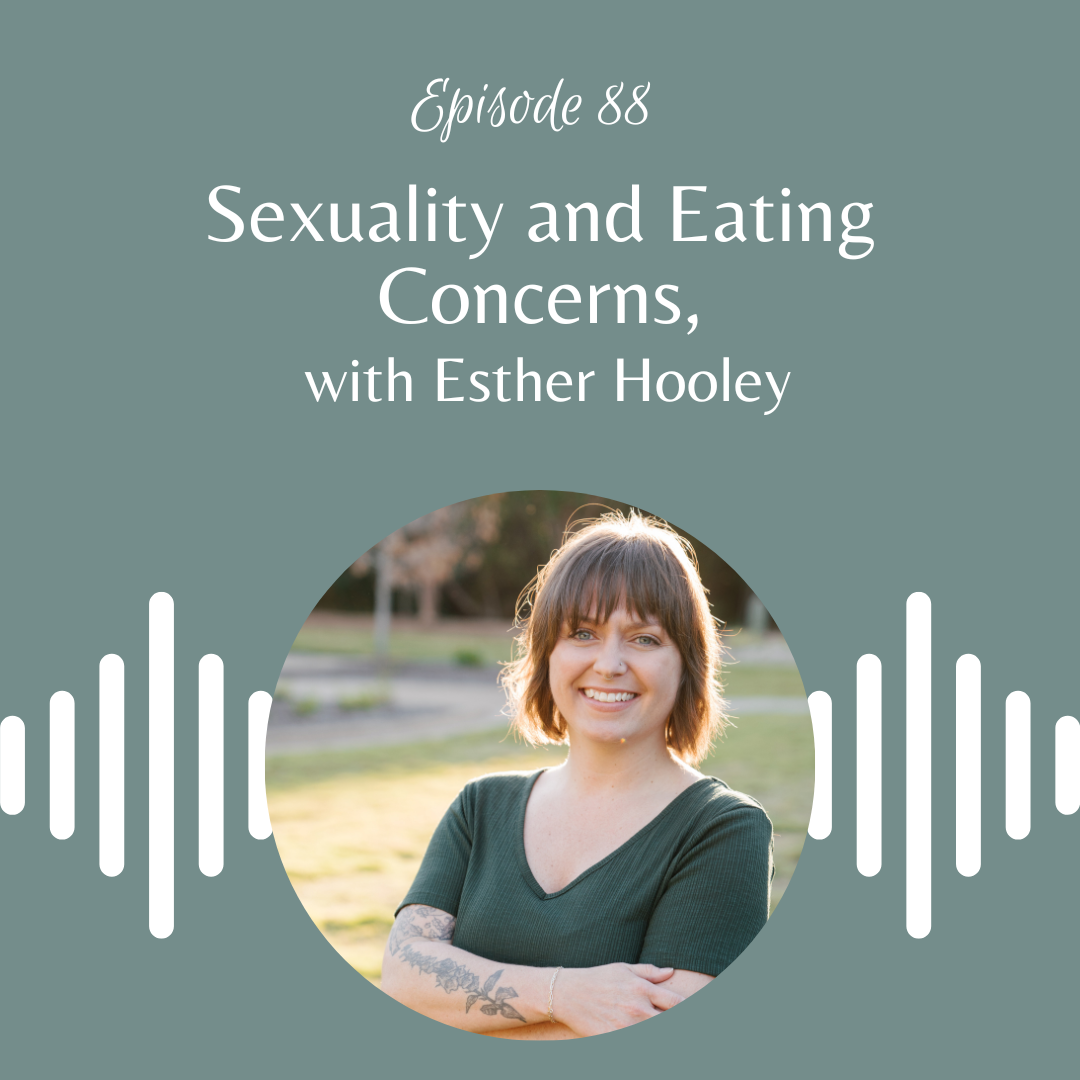Episode 88: Sexuality and Eating Concerns, with Esther Hooley
I have three questions for you that my podcast guest this week suggests we ask ourselves (or, if we're therapists, we ask our clients):
What's your relationship with your sexuality?
What's your relationship with your body?
What's your relationship with pleasure?
Have you considered these questions previously? If not, how did your parts respond to them? Take a moment to notice...
If you've been listening to my podcast for awhile, you won't be surprised to hear me say that sex and sexuality are things that I haven't talked about much at all on the show. It's not at all my area of expertise, and I have parts that still get a little uncomfortable with this subject.
But, a few months ago, I attended a workshop on eating disorders and sexuality and found it really interesting. I hadn't really considered how many commonalities there are between food and sex and how our approach to both can be similar. So I invited the presenter, Esther Hooley, to come on the show. Thankfully, she agreed!
To give you some background, Esther is a psychologist in Waco, TX and practices telehealth across the U.S. She has been a therapist for over a decade and has worked in group practices, university counseling centers, IOP/PHP for eating disorders, and private practice. Esther has spent the past three years receiving advanced training and supervision in sex therapy. This, coupled with her early training in trauma and spirituality, has led her to find her therapy "home" at the intersection of sexuality, trauma, and spirituality. Esther recently finished writing her first book, Embracing Erotic Wholeness: From Shame to Curiosity, on sexuality and purity culture.
Before we get into what Esther and I discussed on the podcast, I wanted to share some info from her workshop. Esther started by talking about the commonalities between food and sex, which are many, when you think about it. For example:
They're both a human drive, and we need both to survive
Both impact connection, relationships, and intimacy
Both are pleasurable (hopefully)
We get inundated with messages from our culture about how to "do" both "correctly"
We get messages from our culture that we need to earn both
Esther also talked about similarities found in research among how people approach food and how they approach sex. For example, when folx are overcontrolled in one area, they tend to be overcontrolled in the other. Research has also shown that significant body dissatisfaction, which is so often at the heart of disordered eating, correlates with severity of sexual dysfunction (i.e. the more dissatisfied you are with your body, the more severe the sexual dysfunction).
Finally, Esther focused on gender dysphoria and eating disorders, noting that folx in a gender minority are more at risk for an eating disorder. She also discussed how those experiencing gender incongruence (the experience of your gender identity not aligning with your assigned sex at birth) can develop an eating disorder in order to punish their body or as a way of trying to shape their body into something more satisfying to them. Eating disorders can also be used to stop physical sexual development, comply with gender stereotypes, and distract from gender dysphoria.
As you can see, Esther covered a lot in this workshop, and really showcased how incredibly complex this topic is. When she came onto the podcast, we started our conversation on what exactly is sexuality. We then went on to discuss such topics as:
What shapes one's sexuality
Common myths about sexuality, including:
The frequency of sex (i.e. believing "everyone is having sex all of the time, and they're having more than I'm having")
The myth of spontaneous desire
Feeling responsible for sexually satisfying one's partner
One's sexual and gender orientations are fixed
Myths about sexual satisfaction
The connection between shame and restriction
How to become more embodied during sexual experiences
Esther also talked about the Good-Enough Sex Model, a model of sexuality created by Barry McCarthy that she uses with clients. Here's the link to a podcast episode with the creator of the model.
We also talked about Purity Culture, a "painful, powerful" movement that came about in the 1990s that created a set of rules surrounding sex and sexuality. Esther noted that Purity Culture "really divided people from themselves and their wants and even their higher power." And again, she's written a new book on the topic--head here to check it out!
Esther shared how she helps people get unstuck in their sexuality and look at "what are the things I'm scared of looking at, and feeling, and experiencing when it comes to sexuality." She suggested looking at the "sexual script" you were given and really noticing what actually fits for you and what doesn't. She gave the example of herself being told that women should be submissive and quiet, and that their job is to give their bodies for other peoples' pleasure and use. She reevaluated this script for herself and created a new narrative. Within this process, she asked a great question:
"If I knew everything would be ok, what would I want?"
And finally, we talked about what therapists can do to feel more comfortable discussing sexuality with our clients (which of course starts with our own work!). Esther suggested asking clients the questions that began this email:
What's your relationship with your sexuality?
What's your relationship with your body?
What's your relationship with pleasure?
This is such an important topic, and I'm so thankful to Esther for coming onto the show to discuss it. Check it out!
Where to find Esther:
Her book: Embracing Erotic Wholeness: From Shame to Curiosity
Books Esther mentions:
The Better Sex Through Mindfulness Workbook
Good-Enough Sex Model interview with Barry McCarthy
Where to find me:
Click below to listen!
